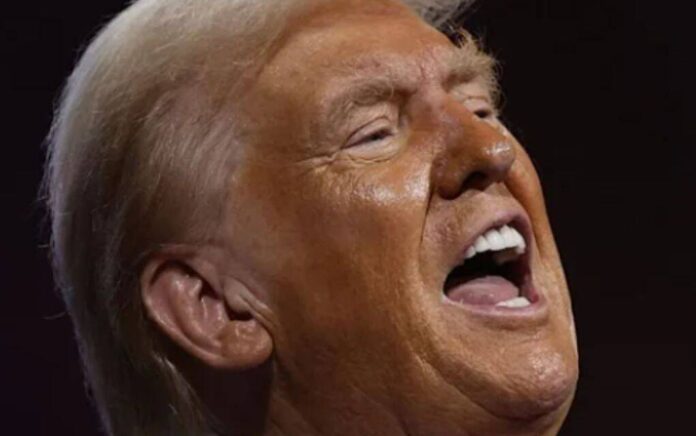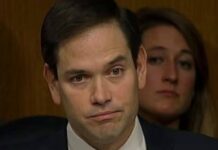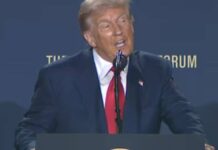
The President has been anxiously awaiting resignation news from one person. This would change everything.
But now Trump is boiling mad over the resignation news he’s just received.
Powell Resists White House Pressure to Resign
Federal Reserve Chairman Jerome Powell has steadfastly maintained that he will not step down from his role, despite mounting pressure from the White House, according to a CNN report published on Friday. Powell has confided in close associates that he intends to complete his term, which concludes in May 2026, sources familiar with the matter told CNN anonymously. The report follows repeated calls from President Donald Trump and some Republican figures for Powell to resign, primarily due to his reluctance to lower interest rates significantly.
“He [Powell] feels very strongly that his responsibility is to maintain that independence,” said Sen. Mike Rounds, a Republican from South Dakota, in an interview with CNN. “I’ve asked him, and he says no, that would reduce the independence of the Federal Reserve.”
Sen. Rounds further noted to CNN that most senators understand the market implications of any perceived coercion of the Federal Reserve. “The vast majority of the members of the Senate are smart enough to have been in contact with the markets, they’ve observed the markets, they know what an impact it would be on the markets should there be any inkling that the Fed was being coerced,” he said. “Powell’s in the right position. He’s got a very tough position, but I respect him for the position he’s taken.”
A Trump adviser, speaking anonymously to CNN, suggested that Powell’s continued tenure is advantageous for the president. The adviser likened the increasing pressure on Powell to the gradual boiling of a frog. “Either Jerome Powell leaps or he boils,” the adviser told CNN.
Additionally, Federal Housing Finance Agency Director Bill Pulte publicly stated on Thursday that Powell “must resign.” Similarly, Republican Alabama Sen. Tommy Tuberville declared Thursday that it was “a great day to fire” the Fed chairman.
Trump’s Criticism of Federal Government Control Over Lending Rates
Austrian School economists, such as Ludwig von Mises and Friedrich Hayek, have long criticized central banks like the Federal Reserve for manipulating lending rates, arguing that such interventions distort market signals and lead to economic inefficiencies. The Austrian perspective emphasizes that interest rates should be determined by the free market, reflecting the true time preferences of savers and borrowers. When the government, through the Federal Reserve, artificially sets rates, it disrupts the natural allocation of resources, often leading to malinvestment and economic bubbles.
The Austrian critique hinges on the concept of the market as a spontaneous order. Interest rates, in their view, are prices that coordinate savings and investment. By lowering rates artificially, the Federal Reserve encourages excessive borrowing and investment in projects that may not be sustainable, creating boom-bust cycles. Mises, in his work Human Action, argued that such interventions misalign production with consumer demand, ultimately causing economic instability. Hayek’s Prices and Production further elaborates that artificially low rates mislead entrepreneurs into overinvesting in capital goods, setting the stage for inevitable corrections.
Historically, Austrian economists point to events like the 1920s credit expansion, which they argue fueled the Great Depression, as evidence of the dangers of central bank rate manipulation. Similarly, they critique the Federal Reserve’s low-rate policies post-2008 for inflating asset prices and creating distortions in housing and stock markets. These policies, they contend, prioritize short-term growth over long-term stability, often benefiting politically connected industries at the expense of the broader economy.
President Trump’s push for lower interest rates aligns with the Austrian School’s skepticism of centralized control over monetary policy, though his motivations may differ. Trump has publicly urged the Federal Reserve to cut rates, arguing it would stimulate economic growth and competitiveness. In a 2019 interview with CNBC, he stated, “We should have a Fed that’s working with us, not against us.” This rhetoric echoes the Austrian view that central banks should not override market-driven rates, though Trump’s focus appears more pragmatic, aiming for immediate economic boosts rather than a philosophical rejection of interventionism.
Austrian economists would likely support Trump’s desire for lower rates only to the extent that it reduces Federal Reserve influence and moves rates closer to market-driven levels. However, they would caution against any government-driven push for artificially low rates, as it perpetuates the same distortions they criticize. For Austrians, the ideal solution is not lower rates dictated by the government but the complete removal of central bank control, allowing rates to emerge organically through supply and demand.
The tension between Trump and Powell highlights a larger debate about the Federal Reserve’s role. Austrian thinkers argue that the Fed’s independence, while touted as a safeguard, still enables it to act as a central planner, immune from market accountability. Powell’s insistence on maintaining high rates to curb inflation, as reported by Reuters in July 2025, clashes with Trump’s growth-oriented agenda. Yet, Austrians would argue that neither high nor low rates set by the Fed are optimal if they deviate from what a free market would produce.
Critics of the Austrian view, such as Keynesian economists, counter that central bank control over rates is necessary to stabilize economies during crises. They argue that market-determined rates could lead to volatility, citing the 2008 financial crisis as a case where Fed intervention prevented deeper collapse. Austrians, however, see such interventions as delaying inevitable corrections, prolonging economic pain. The Mises Institute’s 2023 analysis of Fed policies notes this, noting that federal control over rates have fueled wealth inequality by inflating asset prices, benefiting the wealthy over the middle class.
Trump’s push for lower rates may resonate with their call for less intervention, but only if it leads to a dismantling of the Fed’s rate-setting power. For now, Powell seems content to resist the pressure for him to leave his post.



















